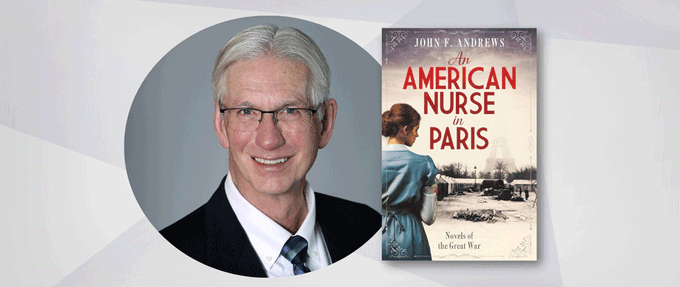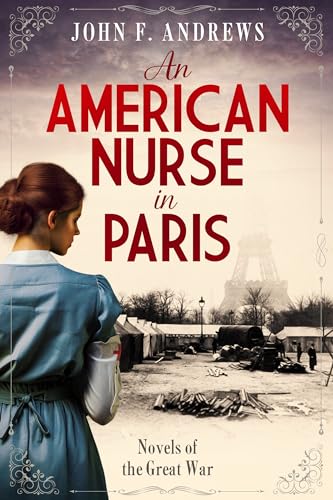In his works, John Andrews consistently explores the impacts of World War I from the intimate lens of the first person. His stories focus on real events, providing readers not only with a vivid glimpse into the period but also fostering empathy for those who lived through them.
Heralded by Kirkus Reviews as “rousing historical fiction with a feminist bent,” An American Nurse in Paris follows a young woman’s journey to becoming a nurse, and the ups and downs she faces along the way, including helping those who fought in the Battle of Belleau Wood. Bolstered by Andrews’ own background as a physician, the result is a rousing tale of loss, determination, compassion, and hope.
We had the opportunity to interview Andrews about his book and his own personal ties to the subject. Read our conversation below, in which we unpack everything from mental health in the military to the literary offerings of historical fiction. Click here to also read an excerpt from the book.
The Battle of Belleau Wood stands as a pivotal moment in World War I, marked by significant triumph for the Allied Forces but at a heavy cost in lives. Can you share how you first learnt about the battle, and why you ultimately decided to structure your novel around it?
Both of my sons, Mike and Matt, are US Marines. My knowledge about the USMC was very superficial at the time Mike enlisted, so I did a deep dive into USMC history, lore, mythology, and current affairs. During that research, I discovered that many historians thought that the Battle of Belleau Wood was a turning point for the Marines—the crucible that forged a new Marine Corps. It was the fulcrum upon which USMC history turned from a small-unit infantry on ships to the Corps that won on Guadalcanal and beyond.
As I talked with my sons and their comrades, I found they had heard of the battle but knew none of the details. My sons took their Kindles loaded with novels when they deployed into war zones, Mike in Iraq, and both in Afghanistan. I realized that a novel would be a great vehicle to show young Marines something about that crucial moment in USMC history. Thus, a novel called Belleau was born. It was too long to publish, so I split it into Our Desperate Hour to cover the battle itself and An American Nurse in Paris to look at the aftermath through the eyes of a young American nurse. The novels are the two sides of one coin.
My World War I research included studying numerous histories, including many no longer in print, medical texts from the era, and two battlefield tours in France with Military Historical Tours. I’ve had active correspondence with several well-known historians of that period as well.
Your portrayal of the aspiring medical journalist, Alice Simmons, provides a lens into the experiences of women during this era, particularly highlighting the reality of sexism. What kind of research did you conduct to develop both the historical context of World War I and the character of Alice? Did you find particular women’s stories from that time that influenced your writing?
I started with a solid baseline understanding of the ways that sexism and misogyny have affected women in nursing and medicine. I’m a male physician who is married to a female physician who has had to confront these problems throughout her career. Nurses I worked with knew they had an empathic ear in mine to discuss those problems as well. My research was superimposed on that base.
This included everything I could find in books and internet searches about the challenges women faced in war journalism and nursing in that era. I studied Emmet Crozier’s 1959 work on the history of journalism in the war, tomes on Red Cross nursing, US Army and Navy nursing, and every memoir I could find.
The story about Henrietta “Peggy” Hull of the El Paso Morning Times in Crozier’s American Reporters on the Western Front 1914-18 was central to Alice Simmons’s story in An American Nurse in Paris. The other sources are too numerous to name here, but are all included in my online bibliography for the novel.
Your body of work reflects a deep understanding of the personal impacts of war, both for those fighting on the front lines and for those remaining at home. How do you navigate the balance between conveying the intimate, first-person experience of your characters while also capturing the broader horrors of war in your narratives?
The mission of my Novels of the Great War series is to show readers aspects of World War I through eyes that are unique in the fiction about that war. Herman Wouk’s character Pug in The Winds of War was my inspiration for Ab Johnson, who appears in the three published novels in this series. His stakes are personal: his son is a Marine second lieutenant going into the battle. His headquarters work enables me to show the broad strategic brushstrokes of the battle in Our Desperate Hour. Ab and my other fictional characters then take readers into the tactical realm, the gritty reality of the battle front in a desperate fight. Nurse Alice Simmons works with both fictional and real people wounded in the battle as she deals with the consequences of misogyny and an attempted sexual assault in An American Nurse in Paris.
I try to convey some of the horrors and challenges of World War I in Novels of the Great War. The first three offer readers what I consider to be a 180-degree view of the Battle of Belleau Wood. I mentioned the first two novels already. Dogs Don’t Cry shows readers the effects of that battle on two orphaned French teens and their dog as the threesome flee the oncoming tide of the German offensive that sweeps into their rural French village. That novel is written for young adults, though it plays well with adult readers, especially those who love dogs.
The deep personal side of these novels grows out of my experiences as a physician treating combat veterans and a Marine father with sons in harm’s way during war.
In consideration of your personal connections and experiences with the subject, how have they shaped your perspective on the challenges veterans face, particularly in terms of mental health? What changes, if any, do you think are necessary to better support them?
I draw on my personal and professional experiences to create the characters and stories in my novels. These include a BA in Psychology and medical training that led to board certifications in Internal, Pulmonary, Critical Care, and Sleep Medicine. Misogyny was prevalent when I entered medical school. My wife is a physician and experienced the effects of that, which she recounted in detail to me over the years. Sue is a big part of the inspiration for my character, Alice Simmons. After retirement, I trained as an EMT and worked with a volunteer fire department in Montana for seven years as an EMT, medical officer, and firefighter.
My experiences as a Marine father started in 2003 when my son Mike enlisted, and continue to this day with his brother, Matt. Mike served for ten years in the enlisted ranks of USMC First Recon and the First Raiders. This included six combat tours on the ground in Iraq and Afghanistan. Matt enlisted in 2005 and later went through officer candidate school and the training to become an infantry officer. His first combat deployment with the USMC 1/23 put him on the ground in Helmand Province at the same time Mike’s raider unit was there. He then trained as an F/A-18 pilot and is still in active service in Marine aviation. I have experienced the anxiety, pride, and stress of being a service parent. I’ve been with fellow parents in their grief over the loss of their son in combat. My sons and many patients have taught me a great deal about combat, its effects on combatants, and its aftermath, including PTSD and associated mental health challenges.
I’m going to use the USMC core values to talk about veteran mental health. We, as a nation, must honor our veterans by making the commitment to provide them with the best mental and medical health services possible. We know combat vets carry a silent burden. Even those not in combat carry baggage many like to deny. We train our military to kill people and break things. We don’t do much right now to help them transition to civilian lives, do we? We need to make the commitment to these fellow citizens, sons and daughters of our nation, who deserve honor. And they must have the courage to step up and seek the help available to them. There is a lot of room for improvement in this entire care and support system.
On a lighter note, one final set of experiences that relate to my novel Dogs Don’t Cry is my life as a dog boy. Yep, that’s me since childhood. I’m one of those people dogs come up to for an ear scratch. Sue and I invited a border collie named Abby to join our household while living in rural Montana. Abby was eight and had some ‘history’. Think canine PTSD. She lived for another four years and gave us great joy, which we returned to her. She may have had a tough life as a cattle dog in Wyoming, but she had a great retirement with us. Abby taught me a lot, and I used that to create the character, Abby, in that novel.
Our readers are, of course, huge fans of historical fiction! What would you say is the most challenging and, on the other hand, rewarding aspect of the genre?
The most challenging part is to weave the history into the tapestry of fiction. The historian part of the writer wants to show the rich detail of well-researched history, all the fascinating personal stories, and the broad brushstrokes of historical events. But the fiction writer has to present that history in a way that never interrupts the narrative dream of their novel. The greatest reward is when the writer succeeds: when readers love a story and historians say, 'well done.'
Accuracy without miring the story down is key. I guarantee my readers that the historical facts I present have been vetted through multiple reliable sources. My Author's Afterword separates fact from opinion or fiction. My mission is to remember forgotten heroes. My novels are compelling historical fiction with a medical angle told with integrity, respect, and humanity that leave my readers with a sense of hope.
Author photo courtesy of John F. Andrews.

